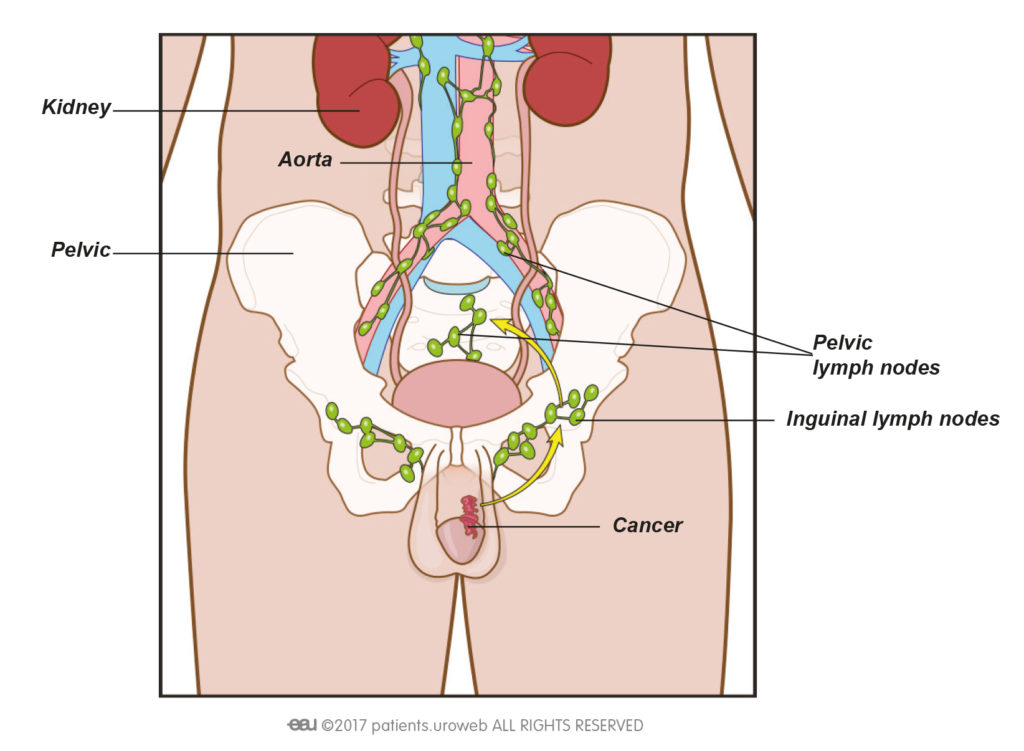Penile cancer is commonly diagnosed by taking samples of a suspected cancerous area (biopsy) or removing a small area of skin (wide local excision), from the penis. It may also be diagnosed following circumcision (surgical removal of the foreskin). A scientist examines the samples under a microscope for cancer cells.
Because penile cancer is rare, you may be referred to a regional treatment centre for further assessment. These centres will have surgeons who specialise in treating penile cancer as well as specialist health care professionals and services who can help support you through treatment.
Further Investigations for Penile Cancer
It is important to assess how much of the penis has been affected by cancer and to see if it has spread to other areas of the body. Further investigations such as a CT or MRI scan may be performed. Sometimes the following medical procedures may also be recommended.
Fine Needle Aspiration (FNA)
This is a procedure performed under a local anaesthetic. An ultrasound scan can be used to identify enlarged lymph nodes (see information below), in the groin area which may be cancerous. A biopsy of these nodes may then be taken. The cells obtained from these samples will be sent for laboratory analysis to determine if they contain cancer.
The Lymphatic System and Lymph Nodes
The lymphatic system transports a fluid called lymph. Lymph will contain various cells and substances that the body no longer needs and passes through small oval structures called lymph nodes. These filter out unwanted substances. Cancer can travel in lymph and can spread to other areas of the body.
Dynamic Sentinel Lymph Node Biopsy (DSLNB)
This procedure can detect cancer cells which may have spread to the nearest lymph nodes near to the penis in the groin. It is not a procedure that is available in every part of Europe.
A local anaesthetic will be applied to the penis and a weak radioactive dye injected. X-rays will be taken of the groin area to identify lymph nodes. Once the lymph node nearest to the cancer has been identified (the sentinel lymph node), the area will be marked. This procedure may take several hours.
An operation under general anaesthetic will then be performed. The blue dye will be injected into the same areas of the penis as before and identify the sentinel lymph nodes. These can then be removed by a small surgical incision.
- Dressings on the biopsy site can be removed after 48 hours and men can bath or shower normally. They should use a clean towel or gauze dressing to pat dry the area or alternatively a hair dryer on a cold setting can be used.
- There will be small dissolvable stitches at the site of the biopsy, which may take a few weeks to fully dissolve.
- Men may experience bruising or swelling in the groin area and scrotum. This is usually due to an accumulation of lymph fluid called lymphoedema which may improve as the body heals. For more information on lymphoedema click here.
Once the lymph nodes have been analysed in the laboratory you will be informed of the results and any further treatment that may be needed.
The MDT (Multi-Disciplinary-Team) Process
An MDT is a group of medical experts who are managing your care. When the results of surgery, blood tests and scans are available, they will make a recommendation about any further treatment that you may need. Several options may be recommended for further treatment, and these will be discussed with you.
Emotions at the time of diagnosis
Most people feel overwhelmed when they are told they have cancer, even if the chance of cure is very high. Many different emotions arise, which can cause confusion and frequent changes of mood. You may experience fear, resentment, and anger. Reactions differ from one person to another and there is no right or wrong way to feel. These emotions are part of the process that many people go through in trying to come to terms with their illness. Partners, family members and friends often experience similar feelings.
Often the information that you will get at diagnosis will be overwhelming and you may not appreciate the implications of what has been said. As well as having to deal with your own feelings and fears, you may also find that a cancer diagnosis and treatment impacts on your relationships in unexpected ways, adding stress when you feel least able to cope with it. Whether at the point of diagnosis or after treatment being able to explore your concerns with someone who understands these problems will allow you to discover the best way to confront what has happened to you.
Many treatment centres will have a team of specialist cancer counsellors who may be able to help men talk about their fears and worries during or after treatment. It is always a good idea to ask your specialist team if counselling is available.


